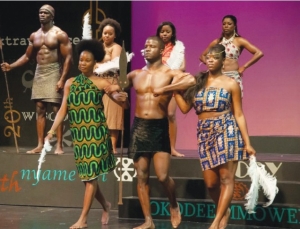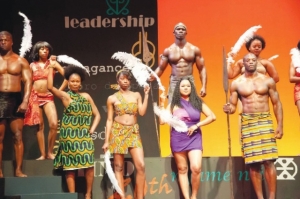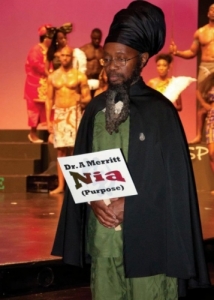Honoring heritage
By Melinda Harrell
Published in News on December 29, 2016 8:10 AM

Submitted photo

Submitted photo
Jovane Holland, far left, performs during the Kumbaa Fest at the World Beat Cultural Center in San Diego in 2014. She has celebrated Kwanzaa for 15 years and says the celebration at the cultural center in California brought many nationalities together to recognize African culture and African American heritage during Kwanzaa.

Submitted photo
Jovane Holland celebrates African American heritage and honors her history through the observance of Kwanzaa.
She has done so for the past 15 years and the basic principles of growth, unity and cultural celebration, continues to resonate with her, she said.
Holland said her parents taught her about the seven principles of Kwanzaa (called Nguzo Saba) -- unity (Umoja), self-determination (Kujichagulia), collective work and responsibility (Ujima), cooperative economics (Ujamaa), purpose (Nia), creativity (Kuumba) and faith (Imani) -- and their value as well as African American history that she wasn't able to learn in school.
"When I was younger, my parents made sure I knew about African American history," she said.
"They made sure I learned what the schools didn't teach. So they taught me about Kwanzaa, and when I went to college I took it with me and on into the Marines."
It was while she was living in San Diego that she celebrated Kwanzaa on a multi-cultural level.
The World Beat Cultural Center held a Kwanzaa celebration that highlighted culture and history, of course, but it was the first celebration at which Holland saw people of all colors come together to observe the holiday.
"Everyone, regardless of nationality or race, can observe and celebrate," she said.
"In San Diego, at the World Beat Cultural Center, we celebrated with other nationalities, and it was great."
Kalilah Mischeaux, owner of The Village Rising in downtown Goldsboro, said she began observing the seven-day holiday ---- which began Dec. 26 and lasts through Jan. 1 ---- 20 years ago after being invited to a friend's house on the final day of the celebration, Imani.
"I had never participated before then, and a friend invited me one year," she said.
"It was educational, empowering and very reflective. It was also fun."
For Mischeaux, Kwanzaa is a time of reflection and reconnection to her heritage.
"It is a time of re-membering, reconnection, reinforcement and reiteration with other people who gather for Kwanzaa," she said.
"It is a time to reflect on my African ancestors, the Middle Passage as well as the struggles and contributions that African Americans face today and to visualize a future in the African diaspora."
Mischeaux said the celebration includes the lighting of the Kinara. Three red candles symbolize the struggles of the people, three green candles symbolize the future and hope, and one black candle symbolizes the people. The black candle is lit on the first day of Kwanzaa.
Along with the Kinara, a mat or "mkeka" ---- where symbols are placed, including an ear of corn which symbolizes children as well as the kikombe cha umoja or unity cup as well as African art and books ---- all of which are representative of commitment to heritage and learning.
Mischeaux says each year she takes the "kikombe cha umoja" and performs the pour libation (tambiko), which is a ritual of ancestral remembrance. She said as she pours water from the cup into a plant, she calls out the name of her family members as well as other African Americans that sacrificed and fought for liberation and equality.
"It is important and puts us in a frame of remembrance," she said.
Holland said Kwanzaa is a largely misunderstood celebration.
"I know there is a very small percentage of people that celebrate (Kwanzaa)," she said.
"There are a lot of misconceptions because some think that it is competing with Christmas, but it isn't. It is an avenue for black people to honor their heritage. If people recognize that, and then they can begin seeing it as a holiday for everyone because of the universal quality of the principles."
Holland said the values taught in the Nguzo Saba can be used by anyone, and without umoja, or unity, which is the principle recognized on the first day of Kwanzaa, then the other principles would not be able to follow.
The holiday itself is in its 50th year, and Holland said that though few celebrate the holiday that honors African heritage, she is confident that it will become more popular and more widley-practiced in the coming years ---- once people recognize that Kwanzaa can involve everyone.
"I think Kwanzaa is on the edge of renewal," she said.
"And I hope so. Without unity you have nothing and can't work with the rest of the principles."
